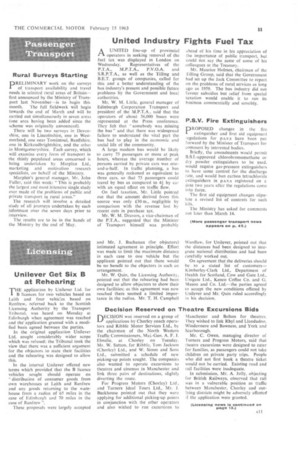United Industry Fights Fuel Tax
Page 13

If you've noticed an error in this article please click here to report it so we can fix it.
A UNITED line-up of provincial /A operators in seeking removal of the fuel tax was displayed in London on Wednesday. Representatives of the M.P.T.A., P.V.0A. and S.R.P.T.A., as well as the Tilling and B.E.T. groups of companies, called for this and a better understanding of the bus industry's present and possible future problems by the Government and local authorities.
Mr. W. M. Little, general manager of Edinburgh Corporation Transport and president of the M,P.T,A,, said that the operators of about 56,000 buses were represented at the Press conference. They felt that "somebody was missing the bus" and that there was widespread failure to understand the vital part the bus had to play in the economic and social life of the community.
A large modern bus would be likely to carry 75 passengers or more at peak hours, whereas the average number of persons carried by private cars was oneand-a-half. In traffic planning, a bus was generally reckoned as equivalent to three cars. so that 75 passengers could travel by bus as compared to 41 by car with an equal effect on traffic flow.
On fuel taxation, Mr. Little pointed out that the amount derived from this source was only £30 m., negligible by comparison with the revenue lost by recent cuts in purchase tax.
Mr. W. M. Dravers, a vice-chairman of the P.T.A.. suggested that the Minister of Transport himself was probably ahead of his time in his appreciation of the importance of public transport, but could not say the same of some of his colleagues at the Treasury.
Mr. Maurice Holmes, chairman of the 'filling Group, said that the Government had set up the Jack Committee to report on the problems of rural services as long ago as 1959, The bus industry did not favour subsidies but relief from special taxation would enable it to run its business commercially and sensibly.
P.S.V. Fire Extinguishers PROPOSED changes in the fire .1extinguisher and first aid equipment regulations for p.s.v.s have been put forward by the Minister of Transport for comment by interested bodies.
Briefly, the amendments would permit B.S.I.-approved chlorobromomethane or dry powder extinguishers to be used, would require gas-pressure extinguishers to have some control for the discharge rate, and would ban carbon tetrachloride extinguishers in p.s.v.s registered on a date two years after the regulations come into force.
The first aid equipment changes stipulate a revised list of contents for such kits.
The Ministry has asked for comments not later than March 14.












































































































